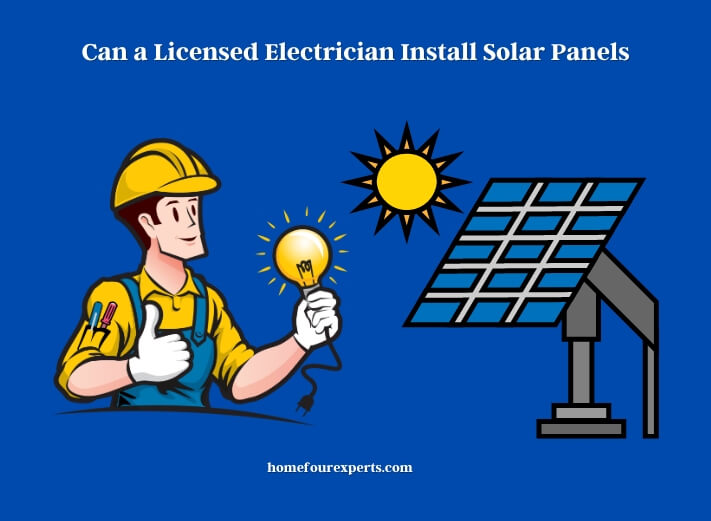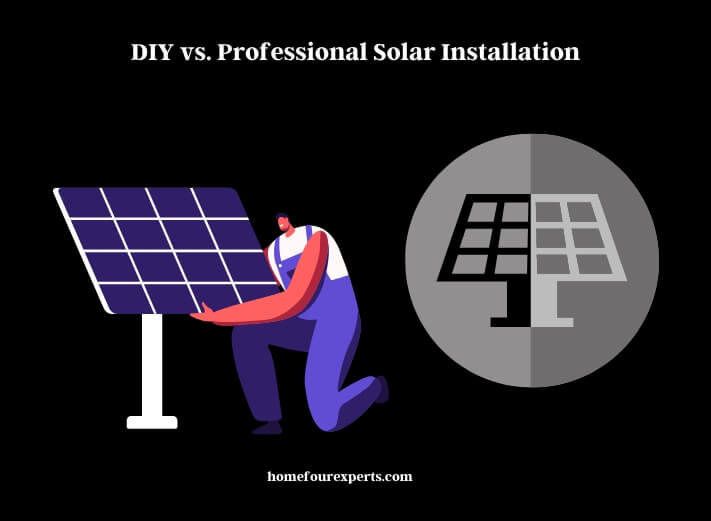Going solar has never been more popular, but navigating the world of solar panel installation can be daunting. You might be wondering: can a licensed electrician install solar panels? In this article, we will explore the role of electricians in solar installations, as well as the qualifications and expertise required. We’ll also delve into frequently asked questions and more to help you make an informed decision.

Can a Licensed Electrician Install Solar Panels?
Yes, a licensed electrician can install solar panels. However, it’s important to note that solar installation requires specific knowledge and expertise beyond standard electrical work. While some electricians may have the necessary training and experience, others may not. It’s crucial to verify their credentials and experience before hiring them for your solar installation project.
Why Hire a Professional for Solar Panel Installation?
Safety Concerns
Solar panel installation can be risky business, involving heights, heavy equipment, and high voltages. A professional installer will have the training and equipment to ensure the job is done safely and correctly.
Efficiency and Performance
A poorly installed solar panel system can lead to decreased efficiency and performance. Professional installers understand the intricacies of solar panel systems and will ensure proper placement and installation for optimal results.
Warranty and Insurance
Most solar panel manufacturers require that their products be installed by a certified professional to maintain the warranty. Professional installers will have liability insurance to protect your property and investment.
What Credentials Should You Look for in a Solar Installer?
NABCEP Certification
The North American Board of Certified Energy Practitioners (NABCEP) is the gold standard for solar panel installation certification. A NABCEP-certified installer will have extensive knowledge and experience in solar installation.
State Licensing
Verify that the installer holds a valid state license for solar installations. Requirements vary by state, so be sure to research the specific licensing requirements for your area.
Company Reputation
Do your homework and research the company’s reputation. Look for online reviews, testimonials, and check with the Better Business Bureau to ensure the company is reputable and reliable.
Can a Licensed Electrician Install Solar Panels on Their Own?
While a licensed electrician can install solar panels, it’s important to recognize that the process involves more than just electrical work. There are also structural and design considerations that a specialized solar installer will be better equipped to handle. So, while an electrician may be able to complete the electrical aspects of the installation, it’s generally best to work with a professional solar installer for a comprehensive and seamless experience.
DIY vs. Professional Solar Installation: Pros and Cons
Deciding between a DIY approach and hiring a professional installer can be a tough call. Here are some pros and cons to consider:

DIY Solar Installation
Pros:
- Potentially lower costs
- Increased control over the project
- A sense of accomplishment
Cons:
- Limited or no warranty protection
- Increased risk of injury or property damage
- Potential for reduced system efficiency
Professional Solar Installation
Pros:
- Expertise in design and installation
- Warranty and insurance protection
- Reduced risk of injury or property damage
Cons:
- Higher upfront costs
- Less control over the project
Solar Installation Costs and Financial Incentives
While the initial cost of solar installation can be high, there are financial incentives available to help offset the expense. Some common incentives include:
- Federal Investment Tax Credit (ITC): This credit allows you to claim up to 26% of your solar installation costs as a tax credit.
- State and local incentives: Many states and local governments offer additional rebates, tax credits, or other incentives for solar installations.
- Net metering: Some utility companies offer net metering programs, which allow you to earn credit for any excess electricity your solar system produces.
Be sure to research and take advantage of any available incentives to help reduce the overall cost of your solar installation.
Finding the Right Solar Installation Company
When searching for the right solar installation company, consider the following factors:
- Credentials: Make sure the company is NABCEP-certified and holds a valid state license for solar installations.
- Experience: Look for a company with a solid track record and experience installing solar systems similar to yours.
- Reputation: Research the company’s reputation through online reviews, testimonials, and the Better Business Bureau.
- Warranty and insurance: Confirm that the company offers warranty protection and carries liability insurance.
Take your time and interview multiple companies to find the one that best meets your needs and budget.
Conclusion
So, can a licensed electrician install solar panels? While it’s technically possible, it’s generally best to hire a professional solar installer with the right credentials and experience. A well-installed solar system will provide you with years of clean, renewable energy while also increasing the value of your property. Do your research, ask the right questions, and you’ll be on your way to a brighter, more sustainable future.
FAQs
Can a licensed electrician install solar panels?
Yes, but it’s essential to ensure that the electrician has the necessary training and experience in solar installations.
What qualifications should a solar installer have?
Look for NABCEP certification, a valid state license for solar installations, and a good company reputation.
Is it safe to install solar panels on my own?
Solar panel installation involves risks such as working at heights, handling heavy equipment, and high voltages. It’s generally safer to hire a professional installer.
What are the financial incentives for solar installation?
Incentives may include the federal Investment Tax Credit (ITC), state and local incentives, and net metering programs.
How do I find the right solar installation company?
Consider the company’s credentials, experience, reputation, warranty, and insurance offerings when making your decision.
What are the pros and cons of DIY vs. professional solar installation?
DIY solar installation can offer lower costs and increased control, but may come with risks such as limited warranty protection, potential injuries, and reduced system efficiency. Professional solar installation provides expertise, warranty and insurance protection, and reduced risks, but may have higher upfront costs and less control over the project.
Read more:
- Best Solar Powered Motion Security Light
- Weight Limitations of Solar Panel Installation
- Solar Power Bank: Definition, Uses & Recommendations
About This Writer

Hi, I am responsible for the 'Homeowners Power Solutions' category. My name is Liam Jaxon and a licensed technician with 7 years of experience in vehicle batteries, electrical gadgets, and home appliances. My working experience in different residential & light commercial electrical sectors and the automobile industry helped to acquire vast knowledge in this industry.